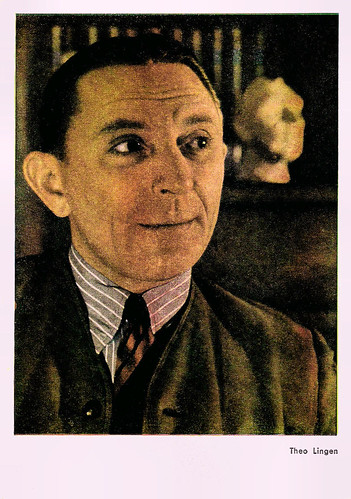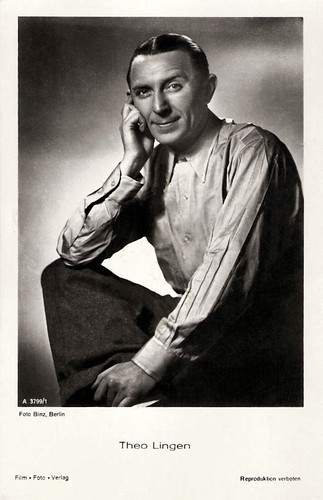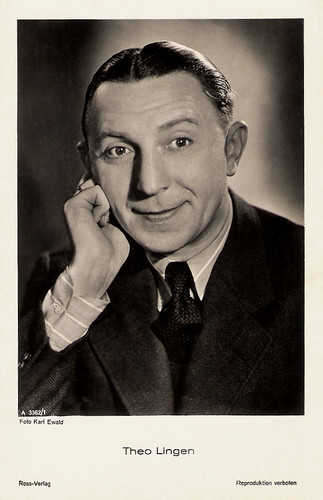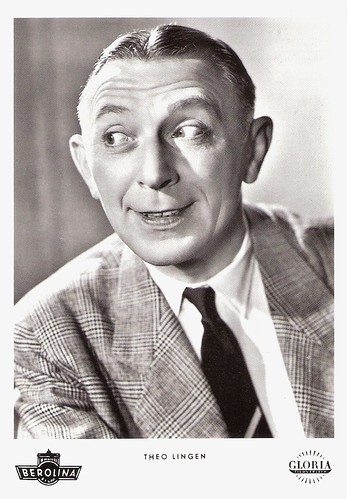German-Austrian comedian, director and author Theo Lingen (1903-1978) enjoyed for decades huge popularity as the devoted servant or bureaucratic dignitary in films. From 1933 on, the nasally-voiced Lingen solely played comedic roles and specialized in squeamish characters who tried to preserve decorum even if the situation was completely hopeless. He starred alongside Hans Moser in 24 films and often worked with directors E.W. Emo and Geza von Bolvary with whom he collaborated until the 1950s. The German and Austrian comedy isn’t imaginable without this brilliant character actor.

German collector card by Ross Verlag in the Bunte Filmbilder series for Martin Brinkmann A.G., Bremen, no. 53. Photo: Projektograph-Film. Theo Lingen in Wer zuletzt küßt… / Who kisses last... (E.W. Emo, 1936).

German collector card by Deutscher Verlag, Berlin, presented by Der Stern. Retail price: 10 Pfennig. Photo: Kurt Ullmann. Caption: Mann kann mich näher kennen lernen (Man can know more about me).

German postcard by Ross Verlag for Das Programm von Heute, Berlin. Photo: Syndikat-Film.

German postcard. Caricature drawing by Eberhard Renziehausen (Rienzi).

German postcard by Verlag und Druckerei Erwin Preuss, Dresden-Freital, Serie I Die neue farbige Filmstarkarte, no. 12. Photo: Charlott Serda.

German collector card. Theo Lingen in Heidi (Luigi Comencini, 1952).
Theo Lingen was born Franz Theodor Schmitz in 1903 in Hanover, Germany. He attended the Royal Goethe Gymnasium – now Goethe School – in Hanover but left before taking the Abitur (final exams). His theatrical talent was discovered during rehearsals for a school performance.
Beginning his professional stage career at the Boulevardtheater Schauburg in Hannover in 1921, the 19-year-old actor adopted as a stage name his middle name together with that of the birthplace of his father, Lingen in the Emsland region of Germany. In the following years he played among others at the Stadttheater Münster, at the Neues Theater in Frankfurt and from 1931 at different places in Berlin. He didn't confine to acting but he also wrote theatre plays which he directed himself.
The film called him up in 1930. He appeared in over 230 films till 1978 and directed 21 films between 1936 and 1960. He played non-comic characters – and sometimes danced - in such musicals as Dolly macht Karriere/Dolly's Way to Stardom (Anatole Litvak, 1930) starring Dolly Haas, and Das Flötenkonzert von Sanssouci/The Flute Concert of Sans-Souci (Gustav Ucicky, 1930) and played friendly villains in the classics M (Fritz Lang, 1931) starring Peter Lorre and Das Testament des Dr. Mabuse/Dr. Mabuses Testament (Fritz Lang, 1933).
The funny effect which his performance had on the public, wasn't to be missed. From 1933 on comedy was his domain and the Austrian comic Hans Moser became his partner in 24 films.
Together they made a contrasting pair in such popular entertainment films as the operetta Rosen in Tirol/The Bird Seller (Géza von Bolváry, 1940), Wiener Blut/Vienna Blood (Willi Forst, 1942) starring Willy Fritsch, and the comedy Schäm' dich, Brigitte!/Shame on You, Brigitte! (E.W. Emo, 1952) with Heinz Rühmann.

German postcard by Ross Verlag, no. 8899/1, 1933-1934. Photo: Aafa-Film.

German postcard by Ross Verlag, no. 9424/1, 1935-1936. Photo: Zander & Labisch, Berlin.

German postcard by Ross Verlag, no. A 2068/7, 1939-1940. Photo: Willott, Berlin.

German postcard by Ross Verlag, no. A 3027/1, 1941-1944. Photo: Binz / Tobis.

German Postcard by Film Foto Verlag, no. A 3799/1, 1941-1944. Photo: Foto Binz, Berlin.

German postcard by Film Foto Verlag, no. A 3624/1, 1941-1944. Photo: Binz / Bavaria Filmkunst.
From 1929 on, Theo Lingenperformed in Berlin, for instance as Macheath in Bertold Brecht's 'Dreigroschenoper'(The Threepenny Opera) at the Theater am Schiffbauerdamm, and in avantgarde plays, but also in cabaret and revue programmes at the Kurfürstendamm.
In February 1928, his daughter, Ursula, was born to Brecht's then-wife, singer Marianne Zoff. Brecht and Zoff divorced in September. Lingen and Zoff married later the same year and also raised Zoff's elder daughter Hanne. Conditions worsened after the 'Machtergreifung' of 30 January 1933. Zoff was half Jewish, which under the Nazi regime usually resulted in a 'Berufsverbot' (professional ban). Lingen thought about going into exile, but because of his great popularity with the general public Josef Goebbels gave him special permission to continue to perform and was able to protect his wife from persecution.
In 1936, Gustaf Gründgens brought him to the Preußische Staatstheater (the Berlin Prussian State Theatre), where Lingen stayed until 1944. During these years, he started to write his own plays. In most cases, Theo Lingen also directed the plays and played the leading role. Later, Lingen also wrote librettos for operas and operettas.
Lingen directed his first, short films in 1936, the four-part series of Till Eulenspiegel. From 1939 to 1956, he directed 18 feature films, including a buoyant film version of Paul Lincke's operetta Frau Luna/Mistress Moon (1941) with Lizzi Waldmüller, and Liebeskomödie/Comedy of Love (1942) with Magda Schneider.
Till the end of the war he acted in such popular comedies as Die Finanzen des Grossherzogs/The Grand Duke's Finances (Gustaf Gründgens, 1934), Der Himmel auf Erden/Heaven on Earth (E.W. Emo, 1935), Ich liebe alle Frauen/I Live All Women (Carl Lamac, 1935) starring Jan Kiepura, Der Mann, von dem man spricht/The Man, About Whom One Talks (E.W. Emo, 1937) with Heinz Rühmann, and Sieben Jahre Pech/Seven Years Hard Luck (Ernst Marischka, 1940). One of his most successful appearances was his double role of a building contractor and a servant in the film version of Lingen's own play Johann (Robert A. Stemmle, 1942).

German postcard by Ross Verlag, no. A 3362/1, 1941-1944. Photo: Karl Ewald.

German postcard by K & B, Berlin, no. 51. Photo: Berolina Film / Gloria.

German postcard by FBZ, no. 132. Photo: Zeyn Film / Niczky. Theo Lingen in Der Theodor im Fußballtor / Theodor in the Football Goal (E.W. Emo, 1950).

German postcard. Photo: Allianz-Film. Theo Lingen in Die Diebin von Bagdad / The Thief of Bagdad (Karel Lamac, 1952).

German collector card. Theo Lingen and Elsbeth Sigmund in Heidi (Luigi Comencini, 1952).

West German postcard by Ufa/Film-Foto. Photo: Wesel / Berlona / Constantin. Theo Lingen in Hurra - ein Junge! / Hooray - a boy! (Ernst Marischka, Georg Jacoby, 1953).
In 1944, Theo Lingen moved to Vienna, and, given the approaching Red Army, retired to his cottage at Strobl on the Wolfgangsee shortly afterwards. For a few days in May 1945, he acted as de facto mayor. He managed to disempower the local Nazi authorities and surrendered to the US Army at St. Gilgen. After the war, Lingen first toured through Austrian cities with the artist collective Bad Ischl, and in 1946 he got Austrian nationality. From 1948 Lingen was an ensemble member at the famous Burgtheater in Vienna and played there until his death many character roles. He also appeared frequently onstage in Germany, most notably in Carl Sternheim satires directed by Rudolf Noelte.
The post-war cinema at first offered him leading roles in remakes of successful early sound films, in sportive slapstick comedies, and in sentimental regional films. Very funny is Jetzt schlägt’s 13/The Clock Ticks Thirteen (E.W. Emo, 1950) with Lingen and Hans Moser as two butlers who suspect each other of being mass murderers.
Other popular films were Heidi (Luigi Comencini, 1952), Pension Schöller (Georg Jacoby, 1960) and Bei Pichler stimmt die Kasse nicht/Pichler's Books Are Not in Order (Hans Quest, 1961) with Georg Thomalla.
During the 1960s German entertainment film sagged more and more into triviality. Lingen often had to impersonate hysterical characters in such slapstick comedies as Die Lümmel von der ersten Bank/To Hell with School (Werner Jacobs, 1968), Pepe, der Paukerschreck/Pepe: His Teacher's Fright (Harald Reinl, 1969) and Tante Trude aus Buxtehude/Aunt Trude from Buxtehude (Franz Josef Gottlieb, 1971) with TV star Rudi Carrell.
In the 1970s, he also worked in television, for example, as a presenter for Laurel and Hardy films. He also appeared in TV films and series and regularly performed on stage until 1971. Theo Lingen died of cancer in Vienna in 1978. He was 75. His daughter Ursula Lingen also became an actress. The city of Vienna dedicated an honorary grave to him at the Zentralfriedhof. The municipalities of Strobl and Lingen (in 2007) named squares in his honour.

German postcard by Grammophon Die Stimme seines Herrn, no. 10648 E. Promotion for a record with the songs 'Eine goldige Frau' (A Woman of Gold) and 'Man darf bei den Mädels nicht schüchtern sein' (You Can't Be Shy With the Girls) from the film Die Austernlilli / The Oyster Lilli (E.W. Emo, 1937).

West German postcard by Kolibri-Verlag. Photo: Junge Film-Union / Saloga.

German postcard by Film-Postkartenverlag, Hamburg-Bergedorf, no. 138. Photo: Junge Film Union / Saloga.

German postcard by Kolibri-Verlag G.m.b.H., Minden-Westf, no. 2022. Photo: Erma / Herzog-Film / Brünjes. Photo: Herzog-Film. Theo Lingen in Opernball / Opera Ball (Ernst Marischka, 1956).

West German card. Theo Lingen in Mit Rosen fängt die Liebe an! / Love starts with roses (Peter Hamel, 1957).
Heli Finkenzeller, Theo Lingen and Marte Harell in the musical comedy Opernball/Opera Ball (Géza von Bolváry, 1939). Source: BD130 (YouTube).
Heinz Rühmann and Theo Lingen in the comedy Schäm' dich, Brigitte!/Shame on You, Brigitte! (1952). Source: BD130 (YouTube).
Sources: Thomas Staedeli (Cyranos), Stephanie D'heil (Steffi-line - German), Filmportal, Wikipedia and IMDb.

German collector card by Ross Verlag in the Bunte Filmbilder series for Martin Brinkmann A.G., Bremen, no. 53. Photo: Projektograph-Film. Theo Lingen in Wer zuletzt küßt… / Who kisses last... (E.W. Emo, 1936).

German collector card by Deutscher Verlag, Berlin, presented by Der Stern. Retail price: 10 Pfennig. Photo: Kurt Ullmann. Caption: Mann kann mich näher kennen lernen (Man can know more about me).

German postcard by Ross Verlag for Das Programm von Heute, Berlin. Photo: Syndikat-Film.

German postcard. Caricature drawing by Eberhard Renziehausen (Rienzi).

German postcard by Verlag und Druckerei Erwin Preuss, Dresden-Freital, Serie I Die neue farbige Filmstarkarte, no. 12. Photo: Charlott Serda.

German collector card. Theo Lingen in Heidi (Luigi Comencini, 1952).
Friendly villains
Theo Lingen was born Franz Theodor Schmitz in 1903 in Hanover, Germany. He attended the Royal Goethe Gymnasium – now Goethe School – in Hanover but left before taking the Abitur (final exams). His theatrical talent was discovered during rehearsals for a school performance.
Beginning his professional stage career at the Boulevardtheater Schauburg in Hannover in 1921, the 19-year-old actor adopted as a stage name his middle name together with that of the birthplace of his father, Lingen in the Emsland region of Germany. In the following years he played among others at the Stadttheater Münster, at the Neues Theater in Frankfurt and from 1931 at different places in Berlin. He didn't confine to acting but he also wrote theatre plays which he directed himself.
The film called him up in 1930. He appeared in over 230 films till 1978 and directed 21 films between 1936 and 1960. He played non-comic characters – and sometimes danced - in such musicals as Dolly macht Karriere/Dolly's Way to Stardom (Anatole Litvak, 1930) starring Dolly Haas, and Das Flötenkonzert von Sanssouci/The Flute Concert of Sans-Souci (Gustav Ucicky, 1930) and played friendly villains in the classics M (Fritz Lang, 1931) starring Peter Lorre and Das Testament des Dr. Mabuse/Dr. Mabuses Testament (Fritz Lang, 1933).
The funny effect which his performance had on the public, wasn't to be missed. From 1933 on comedy was his domain and the Austrian comic Hans Moser became his partner in 24 films.
Together they made a contrasting pair in such popular entertainment films as the operetta Rosen in Tirol/The Bird Seller (Géza von Bolváry, 1940), Wiener Blut/Vienna Blood (Willi Forst, 1942) starring Willy Fritsch, and the comedy Schäm' dich, Brigitte!/Shame on You, Brigitte! (E.W. Emo, 1952) with Heinz Rühmann.

German postcard by Ross Verlag, no. 8899/1, 1933-1934. Photo: Aafa-Film.

German postcard by Ross Verlag, no. 9424/1, 1935-1936. Photo: Zander & Labisch, Berlin.

German postcard by Ross Verlag, no. A 2068/7, 1939-1940. Photo: Willott, Berlin.

German postcard by Ross Verlag, no. A 3027/1, 1941-1944. Photo: Binz / Tobis.

German Postcard by Film Foto Verlag, no. A 3799/1, 1941-1944. Photo: Foto Binz, Berlin.

German postcard by Film Foto Verlag, no. A 3624/1, 1941-1944. Photo: Binz / Bavaria Filmkunst.
Special permission
From 1929 on, Theo Lingenperformed in Berlin, for instance as Macheath in Bertold Brecht's 'Dreigroschenoper'(The Threepenny Opera) at the Theater am Schiffbauerdamm, and in avantgarde plays, but also in cabaret and revue programmes at the Kurfürstendamm.
In February 1928, his daughter, Ursula, was born to Brecht's then-wife, singer Marianne Zoff. Brecht and Zoff divorced in September. Lingen and Zoff married later the same year and also raised Zoff's elder daughter Hanne. Conditions worsened after the 'Machtergreifung' of 30 January 1933. Zoff was half Jewish, which under the Nazi regime usually resulted in a 'Berufsverbot' (professional ban). Lingen thought about going into exile, but because of his great popularity with the general public Josef Goebbels gave him special permission to continue to perform and was able to protect his wife from persecution.
In 1936, Gustaf Gründgens brought him to the Preußische Staatstheater (the Berlin Prussian State Theatre), where Lingen stayed until 1944. During these years, he started to write his own plays. In most cases, Theo Lingen also directed the plays and played the leading role. Later, Lingen also wrote librettos for operas and operettas.
Lingen directed his first, short films in 1936, the four-part series of Till Eulenspiegel. From 1939 to 1956, he directed 18 feature films, including a buoyant film version of Paul Lincke's operetta Frau Luna/Mistress Moon (1941) with Lizzi Waldmüller, and Liebeskomödie/Comedy of Love (1942) with Magda Schneider.
Till the end of the war he acted in such popular comedies as Die Finanzen des Grossherzogs/The Grand Duke's Finances (Gustaf Gründgens, 1934), Der Himmel auf Erden/Heaven on Earth (E.W. Emo, 1935), Ich liebe alle Frauen/I Live All Women (Carl Lamac, 1935) starring Jan Kiepura, Der Mann, von dem man spricht/The Man, About Whom One Talks (E.W. Emo, 1937) with Heinz Rühmann, and Sieben Jahre Pech/Seven Years Hard Luck (Ernst Marischka, 1940). One of his most successful appearances was his double role of a building contractor and a servant in the film version of Lingen's own play Johann (Robert A. Stemmle, 1942).

German postcard by Ross Verlag, no. A 3362/1, 1941-1944. Photo: Karl Ewald.

German postcard by K & B, Berlin, no. 51. Photo: Berolina Film / Gloria.

German postcard by FBZ, no. 132. Photo: Zeyn Film / Niczky. Theo Lingen in Der Theodor im Fußballtor / Theodor in the Football Goal (E.W. Emo, 1950).

German postcard. Photo: Allianz-Film. Theo Lingen in Die Diebin von Bagdad / The Thief of Bagdad (Karel Lamac, 1952).

German collector card. Theo Lingen and Elsbeth Sigmund in Heidi (Luigi Comencini, 1952).

West German postcard by Ufa/Film-Foto. Photo: Wesel / Berlona / Constantin. Theo Lingen in Hurra - ein Junge! / Hooray - a boy! (Ernst Marischka, Georg Jacoby, 1953).
The Mayor of Strobl
In 1944, Theo Lingen moved to Vienna, and, given the approaching Red Army, retired to his cottage at Strobl on the Wolfgangsee shortly afterwards. For a few days in May 1945, he acted as de facto mayor. He managed to disempower the local Nazi authorities and surrendered to the US Army at St. Gilgen. After the war, Lingen first toured through Austrian cities with the artist collective Bad Ischl, and in 1946 he got Austrian nationality. From 1948 Lingen was an ensemble member at the famous Burgtheater in Vienna and played there until his death many character roles. He also appeared frequently onstage in Germany, most notably in Carl Sternheim satires directed by Rudolf Noelte.
The post-war cinema at first offered him leading roles in remakes of successful early sound films, in sportive slapstick comedies, and in sentimental regional films. Very funny is Jetzt schlägt’s 13/The Clock Ticks Thirteen (E.W. Emo, 1950) with Lingen and Hans Moser as two butlers who suspect each other of being mass murderers.
Other popular films were Heidi (Luigi Comencini, 1952), Pension Schöller (Georg Jacoby, 1960) and Bei Pichler stimmt die Kasse nicht/Pichler's Books Are Not in Order (Hans Quest, 1961) with Georg Thomalla.
During the 1960s German entertainment film sagged more and more into triviality. Lingen often had to impersonate hysterical characters in such slapstick comedies as Die Lümmel von der ersten Bank/To Hell with School (Werner Jacobs, 1968), Pepe, der Paukerschreck/Pepe: His Teacher's Fright (Harald Reinl, 1969) and Tante Trude aus Buxtehude/Aunt Trude from Buxtehude (Franz Josef Gottlieb, 1971) with TV star Rudi Carrell.
In the 1970s, he also worked in television, for example, as a presenter for Laurel and Hardy films. He also appeared in TV films and series and regularly performed on stage until 1971. Theo Lingen died of cancer in Vienna in 1978. He was 75. His daughter Ursula Lingen also became an actress. The city of Vienna dedicated an honorary grave to him at the Zentralfriedhof. The municipalities of Strobl and Lingen (in 2007) named squares in his honour.

German postcard by Grammophon Die Stimme seines Herrn, no. 10648 E. Promotion for a record with the songs 'Eine goldige Frau' (A Woman of Gold) and 'Man darf bei den Mädels nicht schüchtern sein' (You Can't Be Shy With the Girls) from the film Die Austernlilli / The Oyster Lilli (E.W. Emo, 1937).

West German postcard by Kolibri-Verlag. Photo: Junge Film-Union / Saloga.

German postcard by Film-Postkartenverlag, Hamburg-Bergedorf, no. 138. Photo: Junge Film Union / Saloga.

German postcard by Kolibri-Verlag G.m.b.H., Minden-Westf, no. 2022. Photo: Erma / Herzog-Film / Brünjes. Photo: Herzog-Film. Theo Lingen in Opernball / Opera Ball (Ernst Marischka, 1956).

West German card. Theo Lingen in Mit Rosen fängt die Liebe an! / Love starts with roses (Peter Hamel, 1957).
Heli Finkenzeller, Theo Lingen and Marte Harell in the musical comedy Opernball/Opera Ball (Géza von Bolváry, 1939). Source: BD130 (YouTube).
Heinz Rühmann and Theo Lingen in the comedy Schäm' dich, Brigitte!/Shame on You, Brigitte! (1952). Source: BD130 (YouTube).
Sources: Thomas Staedeli (Cyranos), Stephanie D'heil (Steffi-line - German), Filmportal, Wikipedia and IMDb.
No comments:
Post a Comment